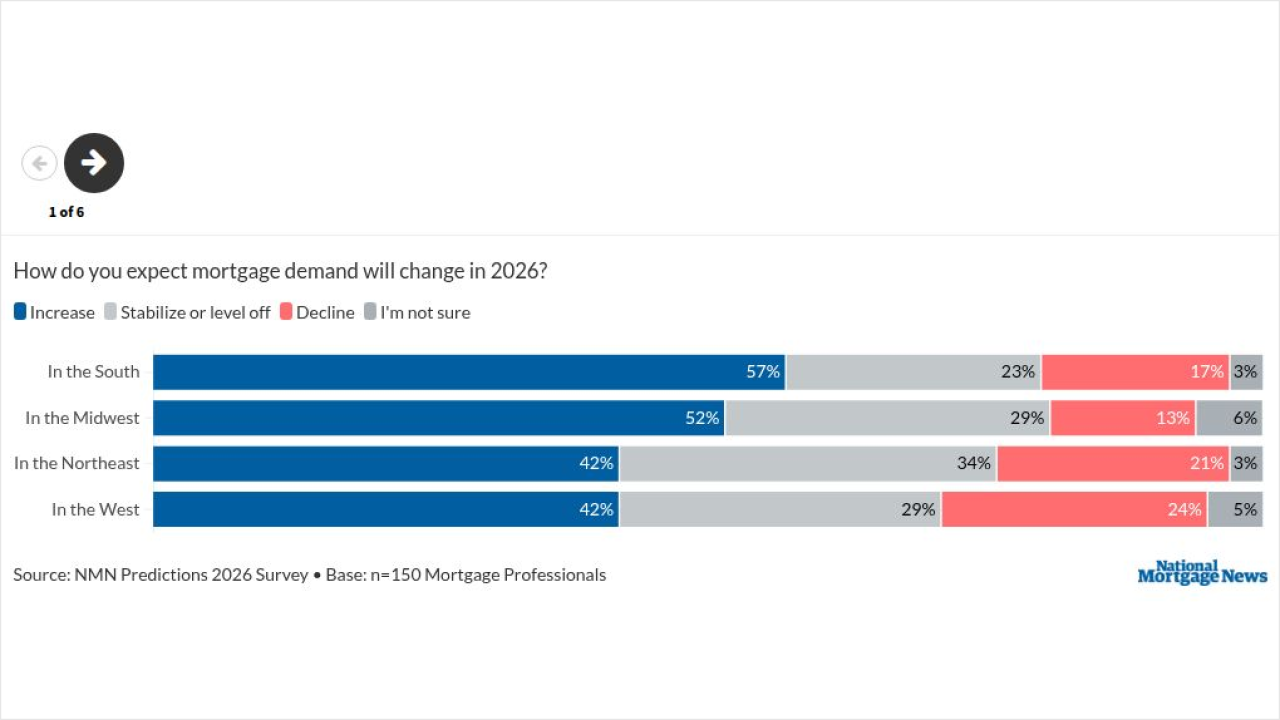
Large bank servicers have a compliance dilemma: they need to quickly shed mortgage-servicing rights ahead of Basel III capital rules at a time when the Consumer Financial Protection Bureau and state regulators are keeping a close watch on the manner in which transfers are handled.
The Basel III rules are slated to be
The cancellation of
What's more, small banks aren't immune to Basel III complications, though among banks with less than $15 billion in assets, fewer than 200 would currently fail to meet Basel III standards under a conservative scenario,
"That is the show stopper, but it is not just confined to New York. All 50 states are going to have to go through this, as well as the CFPB," explained McTaggart, who is currently a partner in the Washington office of law firm Pepper Hamilton.
This is a change in focus for state mortgage regulators, he noted, because historically they have been more focused on looking at originators and their activities. Now they are "equally focused on the servicing side."
According to
Servicers came into focus because of issues with loan modifications and the foreclosure process, but much of that has come from state attorneys general. So the states have been and will continue to shift their focus onto servicing.
"There are whole series of things which could happen with the states and the CFPB [and a servicer] prior to a complete showdown and pulling someone's license or causing a transaction to blow up," the Wells Fargo-Ocwen situation notwithstanding, McTaggart said.
"Product is moving out of the bank side into the nonbank side and so I think in and of itself will cause more attention by the states," he added.
For both originators and servicers, the new regulatory environment for the mortgage industry "is a floor that has to be built upon rather than ceiling that you step up to," said Larry Walker, currently the managing director of KPMG's National Mortgage and Consumer Lending Group. For example, the government-sponsored enterprises'
"We will see private investors coming back to the table with new requirements," that are more stringent than GSE requirements. They are going to want more transparency and more information about the loans in the pools on a real-time basis, said Walker, whose long and varied career in the business included a stint as the president and CEO of the Beal Bank mortgage division and as a managing director for Electronic Data Systems.
"They're going to want to see risk controls in the processes." So that could require loan seller/servicers to adopt such things as Six Sigma quality control measures and process mapping.
The billions in fines that industry firms have paid to resolve compliance issues have largely been because of process failures. "Secondary investors are going to want to see controls in place to prevent that from happening again," Walker said.
"If the process had been managed correctly in the first place, that wouldn't have happened," he added.
The private market has learned its lessons and rather than being less restrictive in its loan guidelines, it will be more restrictive than the GSEs going forward, Walker said.
All parties - lenders, servicers and secondary market - are asking "how do we manage the risks? How do we know what the risks are and how do we manage them so we don't have anything go wrong?" Walker said.
Mortgage industry companies are calling KPMG and asking the advisory firm to help them build an operating model that will "withstand whatever regulatory requirements come at me in the future," he said, adding in the past that was a conversation the business did not expect to have.
One company that provides compliance tools for lenders feels the next big area of compliance issues leading to buybacks could be borrowers who leave their jobs while the loan is in process.
To help lenders be aware of the issue, Milford, Pa.'s Advance Data Corp. has created the Jobless Borrower Index, which measures the percentage of borrowers who did not have a job three days prior to their loan closing.
"Lenders need to know if borrowers are unemployed before a mortgage is closed, so that they can make an informed lending decision based on all the facts," said Allen Johnson, CEO of Advanced Data. "Otherwise they are flying blind and potentially exposing themselves to higher rates of defaults and may run afoul of regulations that could be costly, result in buy-backs, and harm their corporate reputations."
Advanced Data provides tax and employment verification services.
A higher percentage means all lenders need to monitor for this risk, Johnson explained. The company went back over 15 quarters and found in the second quarter of 2011, 4% of borrowers did not have a job three days before their loan closed. For the third quarter of this year, it was just 0.7%, which Johnson termed "pretty significant" for some lenders based on their volume.
Johnson has spoken with quality control service providers and those companies say employment verification issues are a major factor in buybacks.
As part of its verification services, if Advanced Data learns a borrower's employment status has changed prior to closing, it will notify the lender. The index just provides an insight to how often this problem is occurring at any given time.




